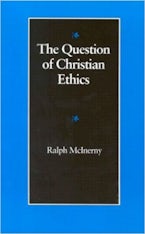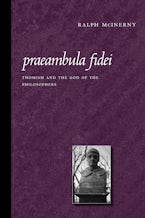- Home
- philosophy
- Ethica Thomistica
Preparing your PDF for download...
There was a problem with your download, please contact the server administrator.
Ethica Thomistica
The Moral Philosophy of Thomas Aquinas, revised edition
Imprint: Catholic University of America Press
5.50 x 8.50 in
First published fifteen years ago, Ethica Thomistica is widely recognized as one of the finest introductions to St. Thomas's moral philosophy. Though the book has been out of print for several years, scholars and students still refer to it as the standard resource on Thomistic ethics. In this much-anticipated, revised edition, Ralph McInerny revisits the basics of Thomas's teachings and offers a brief, intelligible, and persuasive summary.
Chapters: Morality and Human Life; The Good for Man; Ultimate End and Moral Principles; The Structure of the Human Act; Good and Evil Action; Character and Decision; Prudence and Conscience; Religion and Morality
ABOUT THE AUTHOR:
Ralph McInerny is Michael P. Grace Professor of Medieval Studies and director of the Jacques Maritain Center at the University of Notre Dame, where he has taught since 1955. He is founder and publisher of Catholic Dossier magazine; cofounder of Crisis magazine; and author of several books published by CUA Press, including Aquinas on Human Action (1992), The Question of Christian Ethics (1993), and Aquinas and Analogy (1996).
PRAISE FOR THE BOOK:
"Remarkable for its moderation and common sense.... [McInerny] rapidly sketches selected themes from Thomistic moral thinking: what distinguishes the moral activities of man, what is distinctive of moral goodness (in Aristotle and in Aquinas), an analysis of practical reason in relation to natural law, the bases for judging good and evil moral actions, the roles of intellect and will in voluntary activity, the work of virtues as components of moral character, the functions of prudence and conscience, and finally the relation of ethics to religious belief.... For the person who desires a quick and understandable introduction to this subject, this little book can be recommended as readable and reliable."—Vernon J. Bourke, Speculum
"An important contribution both to moral philosophy and to its teaching.... [McInerny] has put us all in his debt by writing it."—Alasdair MacIntyre, Teaching Philosophy
"A clear, thorough and readable introduction to the thought of one of the intellectual giants of the Catholic moral tradition."— National Catholic Register










